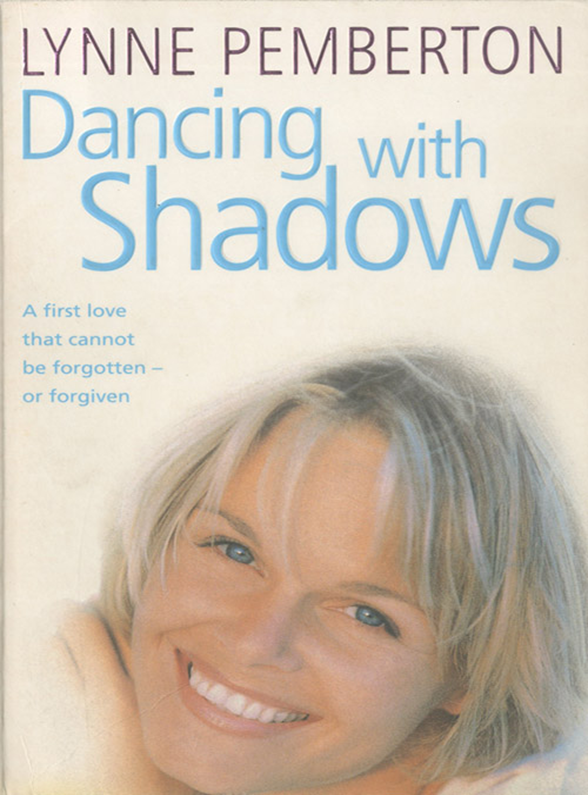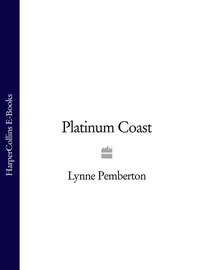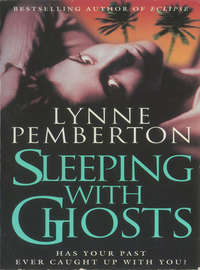
Полная версия
Dancing With Shadows


LYNNE PEMBERTON
Dancing with Shadows

Dedication
For Michael Pemberton Jnr, my only son, whom I love with all my heart.
Contents
Cover
Title Page
Dedication
Chapter One
Chapter Two
Chapter Three
Chapter Four
Chapter Five
Chapter Six
Chapter Seven
Chapter Eight
Chapter Nine
Chapter Ten
Chapter Eleven
Chapter Twelve
Chapter Thirteen
Chapter Fourteen
Chapter Fifteen
Chapter Sixteen
Chapter Seventeen
Chapter Eighteen
Chapter Nineteen
Chapter Twenty
Chapter Twenty-One
Epilogue
Acknowledgements
About the Author
Acclaim for Lynne Pemberton
By the Same Author
Copyright
About the Publisher
Chapter One
It was the last day of February, white and crisp, and very cold. Cold enough to freeze the balls off a brass monkey, Jay remembered the saying, and how strange he’d found it the first time he’d heard it. But he’d always found Hal Jefferson’s English mannerisms inexplicable. The man had talked in riddles; Cockney rhyming slang had constantly embroidered his conversation and he’d have to translate. ‘Apples and pears – stairs; Jack and Jill – bill, geddit?’ Sure he’d got it, but he’d never understood why Hal had bothered using three words where he could have used one. Nobody had.
Jay’s face creased a little, it wasn’t a smile, more the effort of trying to put a date on the time he’d first met the dapper Englishman nicknamed ‘Hal’ because of his halitosis. Once, Jay had asked him what his real name was, suggesting that he use it instead of the derogatory reference to his breath. Hal had stuck his face in Jay’s, breathing heavily, emitting a smell like rotting meat. ‘So I’ve got bad breath; who cares?’
Shaking his head Jay wondered why it mattered, then told himself it didn’t; not any more. The nightmare was over, past, done; finito. But was it? Or would he carry the faces and voices of the inmates in his head for the rest of his life? Would they always be with him, muttering the banalities that at the time had seemed of the utmost importance? In those days it somehow brought colour and character to the grey walls, the grey days, when all he had to worry about was staying alive, staying sane and getting out before he got too old.
He saw her before she saw him. Her back was turned towards him. She was stooped and clothed from head to foot in crow black. He wished she’d worn something bright; red would have been heart-warming, or meadow green. A narrow shaft of late winter sun, stark in its brilliance, glanced across the top of her head where the pale pinkness of her scalp could be seen shining through a sparse covering of granite-coloured hair.
Then she looked up. Her eyes were upon him, the same colour, or so they seemed in this light, as her hair. Yet as she came closer he could see they were blue; not the blue of the cornflowers he’d likened them to as a child, but a cold, milky shade, the brightness dulled by age. Jay stood very still, watching her approach. He couldn’t remember how old she was, seventy-one, seventy-two maybe? He tried to recall how old she’d been when she’d had him, almost forty-six years ago.
When she was a couple of feet away she stopped and, pulling herself up ramrod straight, looked directly into his eyes. There was no tenderness there, only searching, and in that instant he knew what he’d always known yet had never allowed himself to accept. She had never believed in him; but, worse, she’d never forgiven him. He hoped she wouldn’t want to hug him, to take him in her arms, to hold him close; not yet, he wasn’t ready. Jay needn’t have worried, her hands were pushed deep into her coat pockets, and she made no further move. Neither of them spoke.
Her face, he noticed, was a strange yellow colour, darker around her mouth and under her eyes. She looks sick he thought, picturing her weariness clinging to her stick limbs like moss to an ancient stone. But then he was older too, his once coal-black hair was threaded with silver, and lately he’d found white streaks in his pubic thatch. Deep lines etched from his nose to the corners of his mouth, and the crisscross tracery of fine lines around his eyes had nothing to do with laughter. He wished it had.
It was Jay who broke the silence. ‘Thanks for coming, Mom.’ The words came out flat like meat forced through a mincer.
A mist of breath rose, like smoke, out of her open mouth. ‘It was the least I could do, son, you ain’t got nobody else.’
He wanted to say that he had a few friends, decent men he’d met inside, who were either innocent, misguided, or just plain desperate when they’d offended. But he said nothing.
‘It sure is cold,’ she said, shuffling from side to side and pushing her hands even deeper into her pockets. She was wearing rubber-soled brown boots, the mass-produced type sold cheaply in supermarkets and discount stores across the country. They were down at heel. Jay knew she could afford new boots, but she was frugal, mean with herself, deriving immense pleasure from penny pinching. A sudden and unexpected image jumped into his mind: his mother was bent over the kitchen table, her lips muttering figures as she calculated the weekly household accounts. A lifetime of hardship, of scrimping and saving, of making do. Old habits die hard, he thought, if at all.
Her eyes had now darted to the building behind Jay. She stared long and hard, as if looking at something or someone in particular. ‘You want a last look?’
A last look? What a fucking stupid question. The pile of bricks and mortar he’d just left would remain with him for the rest of his life. As would the noise, the smell, the loneliness and the fear. Every square inch of Cedar State Penitentiary was indelibly printed on his subconscious as surely as if it had been branded there with white-hot iron. Jay felt like crying. He’d dreamt of this day, this special day, planned every moment in minute detail all those countless times when loneliness had visited, and revisited, inviting him to despair. He’d longed to taste the air on the outside, certain it would smell and feel different from the stuff he gulped every morning in the exercise yard. What would he have become by now without his dreams? Whenever he’d doubted his sanity, his carefully maintained diet of hope had sustained, comforted and enriched his miserable existence. And always in his imaginings this day had been in springtime; a blossom-bursting, sun-filled morning, with deafening birdsong and an intoxicating sense of euphoria. So why did he feel like shit? Why had a black cloud slipped silently like a shroud around his shoulders? Where was the joy of freedom he’d anticipated for so long, the sense of wellbeing he’d so craved? Had he been too optimistic; but then why not? He’d been incarcerated for twenty-five years: twenty-five birthdays, twenty-five Christmasses denied. Stolen. Tears nagged at his eyes; yet something held them back. Come on, Jay; don’t feel sorry for yourself, you got over that years ago. This is the day you’ve been waiting for. So it’s an anticlimax, what the hell … It’s still the first day of the rest of your life.
Rebecca repeated her question. ‘You want a parting look?’
Jay was staring straight ahead at nothing in particular. ‘What do you think?’
No longer able to look at her son, Rebecca lowered her eyes. She couldn’t begin to articulate how she felt. She’d never been good with words, she’d left that to her fast-talking, no good husband. And now when she desperately needed to tell her son how sorry she was, she couldn’t find a way. She took a step closer to Jay, her face was impassive. ‘I think we should get the hell outta here.’
The drive to New York was a nightmare, the amount of traffic scary, and even more terrifying was Rebecca’s habit of looking directly at him when he spoke. Jay was convinced they were destined for a head-on collision. Having survived twenty-five years of imprisonment, he mused, how ironic if he were killed on his first day of freedom by his mother.
There wasn’t much to say to each other: no common bond; no shared interests; no memories. Well, none that Jay wanted to recall, and eventually mother and son settled into an uncomfortable silence that lasted for most of the journey. Both were relieved when she finally stopped the car in front of the Lowell Hotel. Jay glanced at the uniformed doorman, then at the discreet lobby, recalling his agent’s voice: Made a reservation for you at the Lowell, 28 East 63rd Street. Smart hotel on the Eastside. You can stay there until you sort out an apartment. Your suite’s on the seventh, it’s even got a baby grand in the living room, so if you can play the keys … He got out of the car first, handed his bag to the hovering doorman, then helped his mother out of the driving seat. They stood side by side, her hand resting on the open car door. Jay was smiling, it felt awkward but he kept right on doing it, hoping it looked sincere.
Then Rebecca smiled, too, for the first time. ‘You remind me of your pa, except the way you speak. You don’t talk the same as you did, Jay; you’ve got a fancy accent.’
Jay made no comment, he couldn’t be bothered to explain that he’d been nicknamed ‘the Gent’ in prison, having acquired the new intonation from Hal, the ex-butler from England who’d poisoned his employer – some rich old dame who’d left him a couple of million bucks in her will.
As Rebecca’s smile faded, her mouth slackened and in that moment she looked profoundly sad. Jay thought about his father, then cursed himself and hated his mother for mentioning that he looked like Ellis Kaminsky. It was the first time he’d thought about his father since ten years ago when he’d come across an inmate who had met an Ellis Kaminsky while doing a prison stretch in Illinois. Jay had denied any connection. Ellis Kaminsky had sired him, but that was his only claim to fatherhood. For the first twelve years of Jay’s life, his father had been conspicuous by his absence. A long-suffering Rebecca had always quietly defended her husband. Your father works hard to get nice things for you and your sister. He has to spend time away from home to earn more money so we can have a better house. The move to a bigger house never came, nor did the much promised gifts, like the fishing pole Jay had asked for. After frequent similar disappointments, Jay had begged, then prayed, and eventually given up. Until the day when Kaminsky had left home to work on a construction site in Kansas, promising to bring the pole back for Jay and a bicycle for his sister Fran. They never received the presents, because Ellis Kaminsky never returned. Jay had been fourteen; Fran, twelve. After that their mother had slowly deteriorated, losing sense of who or what she was, given to fits of prolonged depression and introspection. The ‘head of the house’ role had automatically fallen on Jay’s shoulders. He’d tried to console his needy mother and be a father to young Fran. But although he’d tried to make everyone happy, he’d tried too hard and failed miserably. The effort had fuelled both his hatred for his father and his own will to succeed. Perhaps now I can finally make amends, Jay thought. But even as the thought was born, he doubted it was possible. Ellis Kaminsky had taken a large piece of Rebecca’s heart when he’d left, and Jay knew his mother had never completely recovered. And Fran was lost to him; lost to herself, if the stories his mother told were true. Sometimes he doubted this, because on each occasion when he’d enquired about his sister, his mother had been evasive to the point of downright secrecy. Fran was living in Florida, so Rebecca said. Alone, and working as a waitress. Five years after his imprisonment, Fran had moved away from Sand Springs in Montana to California. She’d only visited Jay three times after that and her weekly letters had become monthly – quickly scribbled paragraphs – gradually dwindling to annual events before stopping completely. Where was she now, he wondered, as he was gripped by a vivid recollection of his freckle-faced, plump-cheeked sister – her single pigtail, the same colour as the corn, flying out behind her. It was an age-old image, yet the only one he had. He felt a sharp pang of sadness at the realization that he doubted whether he would be able to pick her out in a crowded room now. The cliché said it all for him … Too much water under the bridge.
Jay inclined his head towards the entrance to the hotel. ‘You want to come in, Mom?’ He wasn’t sure he wanted her to join him, but he was afraid to walk into the lobby alone. He felt his heart hammering. Get a grip, it’s only a hotel for Christ’s sake.
When Rebecca shook her head, he felt immensely relieved. The prospect of trying to make small talk with this stranger, his mother, was too daunting. He wanted her to go, and go quickly, but inwardly berated himself for his churlishness.
‘Naw, I’ve got a long drive back. Anyway, Jay, I think you’ve got some adjusting to do. Pick up some of the pieces. You got your release, your freedom. I never thought I’d see the day. It’s going to take some time to feel right on you, and you don’t want yer old ma getting in the way.’
Jay nodded. ‘Perhaps you’re right, but some time I’d like to talk; just you and I.’ He held out his hand.
She took it, tentatively at first, then grasped it, and held on very tight as if she was drowning. ‘I know, son, I want to talk, too; there’s a lot to say, twenty-five years of catching up to be done. But not right now. You know me, I never was much good at talking.’ She no longer met his eyes and with a faraway expression on her face, she looked into the middle distance. ‘I’m sick, Jay, been sick for a good while now. I didn’t write you, no need, you got troubles of yer own.’ Still gripping him tight, she blinked rapidly.
He looked at the back of her hand, a patchwork of white skin, knotted veins, and dark brown liver spots. ‘Sick with what?’
‘Colon trouble, last year they gave me a handy little purse to shit into. But lately it’s not been working so well, and they want to operate again. So who knows, I might get a classy designer version this time round.’
Her stab at humour failed to mask the dread resignation he detected in her small voice. She was dying; of that he was certain. He didn’t want her to die, but he knew he wouldn’t miss her. But then who would he miss? He thought about the few friends he’d made inside, and that was it. Concerned, but not devastated, Jay reproached himself and said, ‘I’ll make some enquiries, Mom, find the best surgeon, and we’ll get you fixed up with an appointment.’
‘You’ll do no such thing. I don’t want any fancy docs. I’m OK with the one I’ve got. Charles Cornwell is a good man, he’s doing fine by me. Listen, son, I ain’t getting any younger and we’ve all got to go some time, it’s only a matter of how.’ Jay opened his mouth to speak, but she beat him to it. ‘I’ll tell you all about it when you come home.’
Jay thought about home; where was home? The ramshackle wooden house in Sand Springs, Montana that poverty had hijacked long before he’d left? It was where he was born, where he’d started his journey, and he had no intention of ending it there. His mother had refused to leave, even after he’d had his first royalty cheque, and had offered to buy her a new apartment near her sister in a better neighbourhood.
‘I’ve got a few things to sort out here,’ he said, returning to the present. ‘As soon as I’ve done that, in a couple of weeks, I’ll come home, I promise.’
They both knew he was lying.
‘Well I ain’t goin’ nowhere so when you’re good and ready, son …’ She paused. ‘Then we’ll talk.’
For a few minutes neither moved. They held hands, like lovers reluctant to part, saying nothing, lost in thought. Had they compared those thoughts, they would have been surprised at how similar they were. Both were of deep regret.
‘This is great stuff, Jay!’
Ed Hooper was tapping a deep pile of foolscap on top of his battered desk. It was the manuscript of Jay’s latest novel. With the flat of his other hand the agent stroked the mahogany surface, thinking about the day he’d bought the desk. Spring 1968. His buddy, Abe Lesser, had been selling second-hand furniture at the time and Ed recalled how he’d haggled with Abe, who’d insisted the desk was early nineteenth century. Ed had beat him down to a hundred and twenty dollars; more than he could afford at the time. The antique was intended for a big space, and it had incongruously filled his shoebox office in SoHo. He’d named it ‘Samson’, after Bill Samson his first client, and in 1976 Samson had moved uptown with him to his new office on 76th and York. The grander premises suited Big Samson admirably; solid and important, the desk dominated the twenty-foot-square room. Samson had hosted six secretaries’ butts; been party to ten mega deals, hundreds of major deals, and thousands of minor ones. One crazy night after a party, Ed had even had a blow job under the desk; and he’d fucked his first wife over it. Samson could tell a tale or two. It was part of him, the one piece of furniture he’d ever felt really attached to, the one constant in his life. Samson looked good when cluttered; two cigar boxes, one for the legal cheroots the other for black market Cubans, helped the effect. As did a monogrammed ashtray from Ed’s mother, and the eclectic mix of junk he’d collected or been given over the years, including an engraved golf ball on a silver plinth from his teenage son, Josh. And a framed photograph of himself, and Josh at fifteen, on a fishing trip in Key West. Ed liked to put his feet on Samson, happy in the knowledge that he wouldn’t receive a scathing comment from his ex-wife Carole, who had repeatedly asked why he insisted on keeping such a beat-up old relic. Thank God he’d resisted her influence; he liked his office exactly as it was. The floor was carpeted in moss green; the walls were painted white and left unadorned; there was a free-standing rosewood veneered bookcase full of titles he’d handled, and of twentieth-century classics. The room also boasted a couple of leather chairs picked up wholesale twelve years before, and a Tudor oak chest acquired by Carole in a furniture sale. She’d kicked up a stink when he’d used it as a coffee table. But then Carole, after six months of marriage, had kicked up about mostly everything he did. Ed narrowed his eyes, registering the ironic fact that next week he’d be signing divorce papers on the very same spot where he’d first had Carole six years ago almost to the day. Bitch. Double-crossing, money-grabbing, beautiful, devious bitch.
Turning his attention back to the manuscript, he stroked the paper lovingly, a smile creasing his battered face. A ‘lived-in’ face, he liked to think, as he tried to convince himself every morning that what he saw in the bathroom mirror was not a short, pig-ugly, fat Yid, who’d inherited his maternal grandmother’s leathery pockmarked skin and deep-set eyes. His father, God rest his soul, had given him very little except a long hooked nose and a rubbery bottom lip. The pair of them had a lot to answer for. Ed hated being ugly. All his life he’d surrounded himself with beauty; had idolized beautiful women. This was a weakness for which he’d duly suffered, yet he kept repeating the pattern. His father always said that everybody makes mistakes; it’s only fools who don’t learn by them. If that was true then Ed had to accept that he was a prize turkey. He was addicted to beauty, basking in its reflection, hoping some of it would rub off. Just like those dumb idiots who married intellectuals on the same principle. Only it never quite worked out that way. His best friend Joe, when they were teenage kids, hanging out and trying to get laid, had said that with a face like his the only way to get beautiful women was to become successful. Make money, Ed, lots of it. Women love rich, powerful, ugly men. Look at Henry Kissinger, he’s had more pussy than he’s known what to do with.
Ed smiled. It softened his features and for a split second he looked like an old teddy bear; the kind kids cherish for life. Then he was talking again, doing what he did best: negotiating; bullshitting; doing the deal; making a buck, making a million bucks.
‘When I say great, I mean fucking brilliant, Jay! Like, the best. You’re a great writer, man; you know that? You’re a fucking born-again Hemingway. You listening to me, Jay?’
There was no reply. Ed shrugged, lit a cigar, and mentally digressed back to the time he’d read Jay’s first manuscript, Killing Time. A man calling himself Ivanov had delivered the three hundred and sixty pages in a brown paper parcel tied with tatty string. He’d refused to be questioned, saying that there was a letter from the author inside which would explain everything. He was referring to Jay’s simple note explaining that he’d read about Ed Hooper in the New York Times, and wanted an honest appraisal of his first novel. He could be contacted at the Cedar State Penitentiary. The story, a harrowing account of a hitman’s revenge on the Mafia godfather who had destroyed his family, had captured Ed from page one. He would never forget the churning in his gut after the first chapter, or his mounting excitement when he’d thought the narrative couldn’t get any better, and it had. He’d put all his other work on hold, finishing the book in one sitting. The knowledge that in Jay Kaminsky, alias Will Hope, he’d discovered a great talent, and the fact that he had a hot property to sell, had kept him awake for several nights.
‘Come on, Jay, say something. I just called you another Hemingway! What more do you want?’
He was talking to Jay’s back, clothed this morning in new jacket and slacks, and a button-down cotton polo shirt that hung loosely on its wearer’s narrow frame. Jay felt uncomfortable in the designer clothes. Yesterday he’d allowed Ed to lead him into the strange and terrifying world of Madison Avenue. They had started in Ralph Lauren. To begin with, the sight of so much merchandise had been daunting; later Jay had felt like a kid again, let loose in a toy shop, unable to make up his mind what to have first. Oh, the joy of touching the huge array of suits and shirts – wool so fine it caressed the fingertips; crisp cotton, cool to the touch; the smell of polished wood, mingled with a spicy fragrance which Ed informed him was Polo aftershave. The young sales assistants, both male and female, dressed in de rigueur designer gear, impressed Jay even more than the customers who graced the sensual emporium. Heads held high; flawless skin; perfect teeth and supremely confident smiles. Short skirts; panty-hosed legs so shiny they looked gloss-painted, breasts and pecs straining against well-cut fabric. All selling sex, selling the Lauren lifestyle, the dream. Wear a Polo shirt, or a Ralph suit, and you’ll be considered upwardly mobile, recognized as tasteful, sexy, desirable. Jay had been reluctant to try on the clothes Ed picked out for him, and had agreed only after much encouragement from a very attractive girl called Jodie. He’d fumbled with zips and buttons, overcome with embarrassment when Jodie had pinned his trouser hem, and he’d felt his cock get hard.






